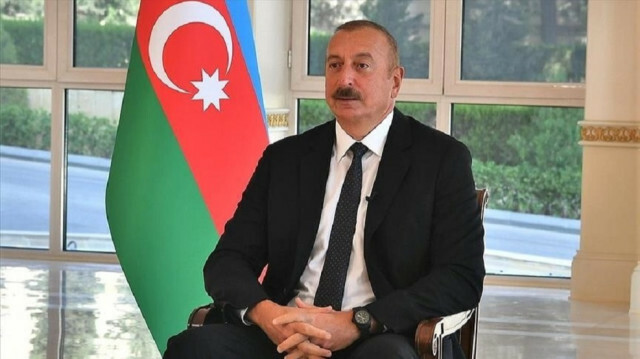
Following victory during last year's Karabakh War, Azerbaijan prevented drug trafficking from Iran to Armenia, and further to the European countries, Azerbaijan’s president said Friday.
"Over the past year, after Azerbaijan had regained control over the 130-kilometer (81-mile) section of the state border with Iran, which was under the control of Armenia for about 30 years, and thereby blocked a drug trafficking route from Iran through the Jabrayil district of Azerbaijan to Armenia and further to Europe, the volume of heroin we have seized in other sections of the Azerbaijan-Iran border has doubled compared to the same period of previous years. This suggests that for about 30 years, Armenia, in collusion with Iran, used the occupied territories of Azerbaijan to carry out drug trafficking to Europe," Ilham Aliyev said while addressing the Commonwealth of Independent States (CIS) Heads of State Council's session via videoconference.
Aliyev emphasized that during the years of occupation by Armenian forces, he repeatedly said the occupied territories were being used "for drug trafficking and training of international terrorists."
"It is a proven fact today," he said.
Touching on the so-called “Armenian prisoners of war," Aliyev said his country handed over all prisoners of war who were detained during the war "earlier than Armenia handed over Azerbaijani prisoners of war" to Baku. "More than two weeks after the signing of the Trilateral Statement (between Moscow, Baku and Yerevan), in late November last year, a sabotage group of 62 people infiltrated the rear of the Azerbaijani Armed Forces in the already liberated territories from the Shirak region of Armenia to commit subversions. It was disarmed and captured by Azerbaijani servicemen. In accordance with international conventions, these saboteurs cannot be considered prisoners of war," he said.
He said the war and conflict "belong to the past," and Azerbaijan is ready to start negotiations with Armenia on the delimitation of the border on the condition of mutual recognition of territorial integrity.
"We are also ready to launch negotiations on a peace agreement with Armenia. Azerbaijan, as a victorious country, is ready to normalize relations. We do hope that the Armenian leadership will not pass up on this historic opportunity," he said.
- Mine clearance
Aliyev highlighted primary problems Azerbaijan is facing are related to the clearance of mines in liberated territories and the restoration of destroyed infrastructure, buildings, houses and historical sites of Azerbaijanis.
"Since the war ended, more than 150 Azerbaijani citizens have been killed or seriously injured by landmines. Armenia refuses to provide us with complete maps of the minefields. The few such maps that have been given to Azerbaijan have an accuracy of about 25%," he said.
The president said that almost all buildings and historical sites in the liberated territories have been destroyed in almost 30 years of occupation.
"Of the 67 mosques in liberated territories, 65 have been completely destroyed. The remaining two, both in run-down condition, were used by the occupiers to keep pigs and cows, thus deliberately insulting the feelings of Muslims."
He underlined that in Shusha -- known as the pearl of Karabakh -- Armenia destroyed 16 of 17 mosques that were there before the occupation.
"One mosque was left to demonstrate 'tolerance,' and there was an attempt to portray it as Persian with complicity from so-called specialists from Iran," he said.
"Houses and public buildings were taken down brick by brick and sold to Armenia and Iran. This is the legacy of Armenian vandalism perpetrated in the territories of Azerbaijan," said Aliyev.
The Azerbaijani leader also noted that "immense damage" has been caused to nature as around 60,000 hectares of forests have been "cut down, sawn and sold to Armenia and Iran."
Illegal exploitation was carried out on Azerbaijan’s gold deposits and other natural resources, he said.
- Liberation of Karabakh
Relations between the former Soviet republics of Armenia and Azerbaijan have been tense since 1991 when the Armenian military occupied Nagorno-Karabakh, also known as Upper Karabakh, a territory internationally recognized as part of Azerbaijan, and seven adjacent regions.
New clashes erupted Sept. 27 last year that saw Armenia launch attacks on civilians and Azerbaijani forces and violate several humanitarian cease-fire agreements.
During the 44-day conflict, Azerbaijan liberated several cities and nearly 300 settlements and villages that were occupied for nearly three decades.
A Nov. 10, 2020, cease-fire deal mediated by Russia also included future efforts for a comprehensive resolution to the dispute.
The cease-fire is seen as a victory for Azerbaijan and a defeat for Armenia, whose armed forces withdrew in line with the agreement.
Before the victory, about 20% of Azerbaijan’s territory had been under illegal occupation.
On Jan. 11, Russia, Azerbaijan and Armenia leaders signed a pact to develop economic ties and infrastructure to benefit the entire region. It also included the establishment of a trilateral working group on Karabakh.













